Making healthcare better as a Senior Clinical Engineering Manager
Healthcare is critical globally and the engineers who support and maintain the equipment are key. In this article, one engineer describes his career and how he is part of organisations making life better in hospitals and medical facilities. Clement Nana Yaw Adjei Appiah Anokye (Clement N.Y.A Appiah Anokye) is the Senior Clinical Engineering Manager at the Upper East Regional Hospital in Ghana. As well he volunteers for Mercy Ships, the Clinton Health Access Initiative and Operation Smile. Clement is also pursuing a master’s degree.
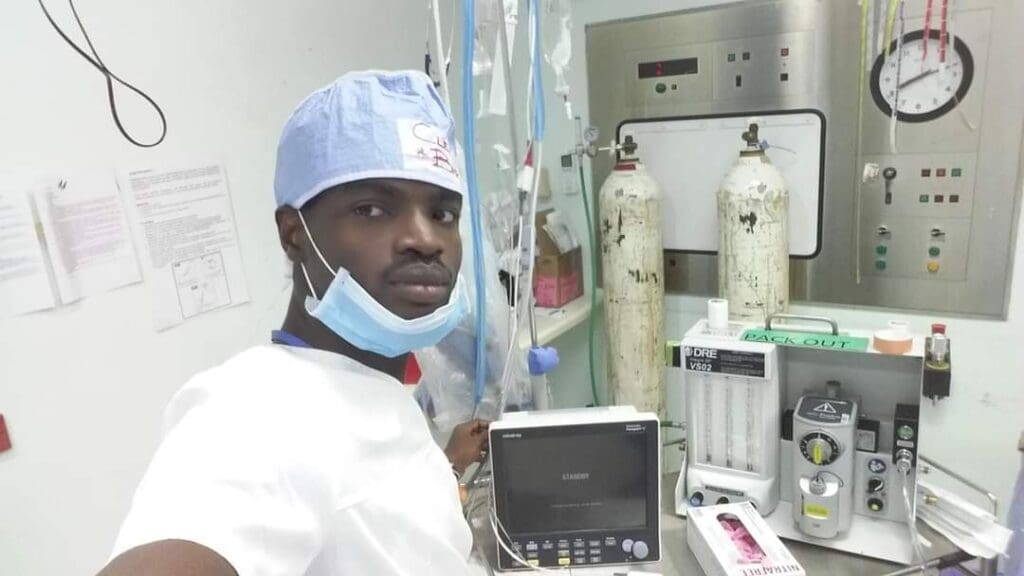

A Senior Clinical Engineering Manager in Ghana making healthcare better in hospitals – meet Clement N.Y.A Appiah Anokye
Background
Why did you decide to study biomedical/medical Engineering?
Upon receiving my Senior High results, I recognized that, despite their satisfactory nature, they fell short of the requirements for pursuing a medical degree. Consequently, I corresponded with the registrar of KNUST (Kwame Nkrumah University of Science and Technology) seeking guidance on alternative academic paths. His recommendation was to consider engineering as a viable option. Given my affinity for biology during my academic tenure, my interest was piqued upon discovering that the University of Ghana offered a programme in Biomedical Engineering. Despite uncertainties regarding its trajectory, I eagerly embraced the opportunity to pursue this course.
Were there any childhood interests which were a factor?
During my formative years, I harboured a passion for mending objects, firmly believing in the prospect of restoring anything that was broken. This inclination led me to attempt the repair of my Walkman independently. Additionally, during my childhood, I undertook a project focused on constructing a moving car that harnessed magnetic forces.
Why did biomedical engineering attract you rather than another type of engineering?
I had a deep fondness for biology, particularly during my school years, where my fascination with the intricacies of nature was pronounced. Amidst the prevailing trend of many students primarily competing to excel in exams, I distinguished myself by cultivating a profound interest in the intellectual aspects of nature. This captivation extended to understanding how such intelligence could be integrated into technology. The allure of Biomedical Engineering, with its strong alignment to biology compared to other courses, was the primary factor that drew me towards it.
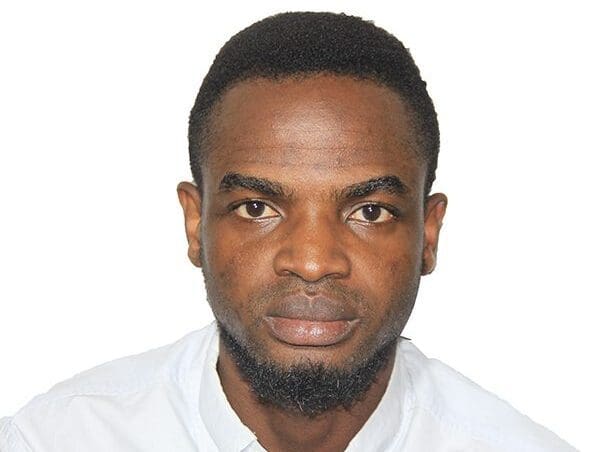

The appeal of a career making healthcare better with medical engineering
Was working to help other people a factor in your decision?
A deeply ingrained aspiration to assist others has been a constant in my life. During my earlier years, I grappled with the challenge of being dismissed from university due to financial constraints. Reflecting on those times, I often contemplate how I managed to succeed in my examinations. I consistently harboured the conviction that, as a future global leader, I would endeavour to provide access to resources for everyone. My mentor, Professor Kaufmann at the University of Ghana, played a pivotal role in nurturing my self-confidence. She imparted the insight that I possessed unique qualities, empowering me to effect positive change in any sphere I chose to influence. I closely emulated a set of values and principles from her guidance.
Types of equipment used in healthcare
What types of equipment have you worked on in your career so far?
I have primarily engaged with laboratory equipment. These include, haematology analysers distillation plants, water baths, and chemistry analysers. Additionally, I have worked with theatre equipment such as suction machines, operating tables, anaesthesia units, and patient monitors. In the Central Sterile Services Department (CSSD), I have experience with equipment such as sterilizers. Furthermore, my involvement extends to ward equipment such as wheelchairs, hospital beds, stretchers, vital signs monitors, and weighing scales. Other items include oxygen concentrators, ventilators, defibrillators, blood bank refrigerators, and washing machines.
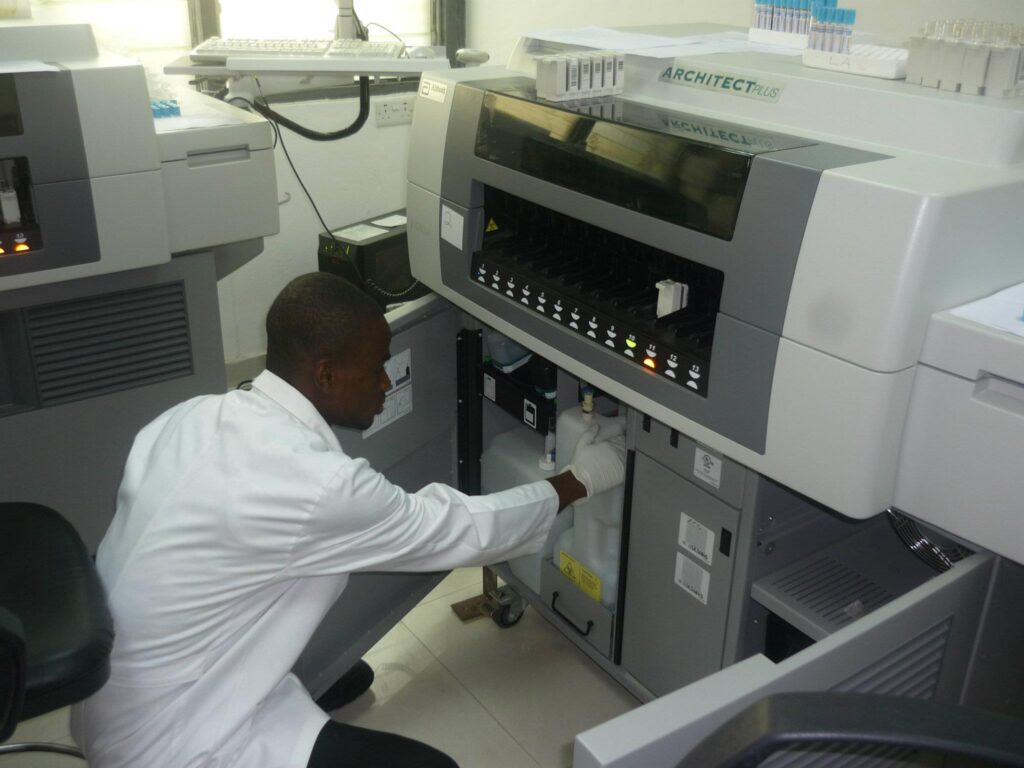

Current work in healthcare
You are the Senior Clinical Engineering Manager. What exactly does your role involve?
In my role as a senior engineer, responsibilities include updating databases with newly installed medical equipment, providing recommendations to colleague managers, and offering evidence to inform the procurement of medical equipment. Task delegation is also part of the role. My role also includes designing Planned Preventive Maintenance strategies and ensuring the availability of spare parts, particularly for life support equipment.
Essentially, the role falls under healthcare technology management, but given the context of operating in a low-middle-income country, it necessitates a considerable degree of improvisation and innovation to establish a safe and reliable system.
Do you still have the chance to be hands-on?
Yes.
How much of your time is spent managing other people?
In my situation, I work with a technologist who has extensive experience. Managing his tasks does not require a significant amount of my time. Given the opportunities to engage with international entities, both domestically and abroad, I share my experience and knowledge with him. Simultaneously, I gain valuable insights by observing and learning from his work.
You are also part of the GHS Oxygen Plant Project. What does this work involve?
Being part of the GHS Oxygen Plant Project has exposed me to profound knowledge in sustaining the operation of an oxygen plant. Furthermore, it has facilitated connections with human resources affiliated with the World Health Organization, who possess considerable expertise in this field.
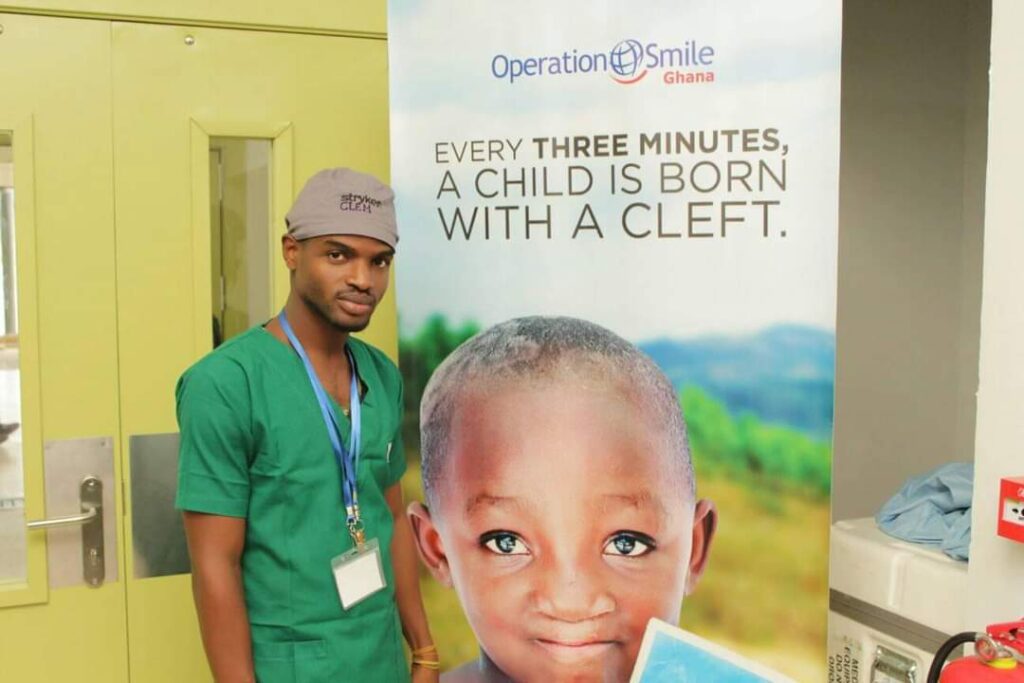

Volunteer work in healthcare
You work for Mercy Ships, the Clinton Health Access Initiative and Operation Smile. Could you explain the work you do for each of these organisations?
I take periods of leave or personal time off duty to contribute to Mercy Ships. This is typically for around one and a half months. During these assignments, I collaborate with dedicated Biomedical technicians such as Guido Kortleven and Deborah Nustugah. Our responsibilities involve repairing medical equipment that malfunction during field service, conducting verification checks, and implementing preventive maintenance measures. Additionally, we replace damaged accessories or spare parts. Mercy Ships ensures that technicians have access to all the necessary resources, making the work highly enjoyable.
I also seek one-week permission to participate in Operation Smile missions. I have been part of numerous missions in Ghana and around three in Malawi. Operation Smile collaborates with both local and international healthcare providers to bring smiles to children with cleft lip and palate. The commitment to international standards at Operation Smile is a compelling aspect of my involvement.
In my capacity as the Project Communications Manager at Ghana Medical Help, I am actively engaged in developing a Computer Management System aimed at enhancing the management of medical equipment throughout the country.
During my tenure at Clinton Health Access, I had the opportunity to interact with various health facilities to gather valuable information regarding their oxygen demand.
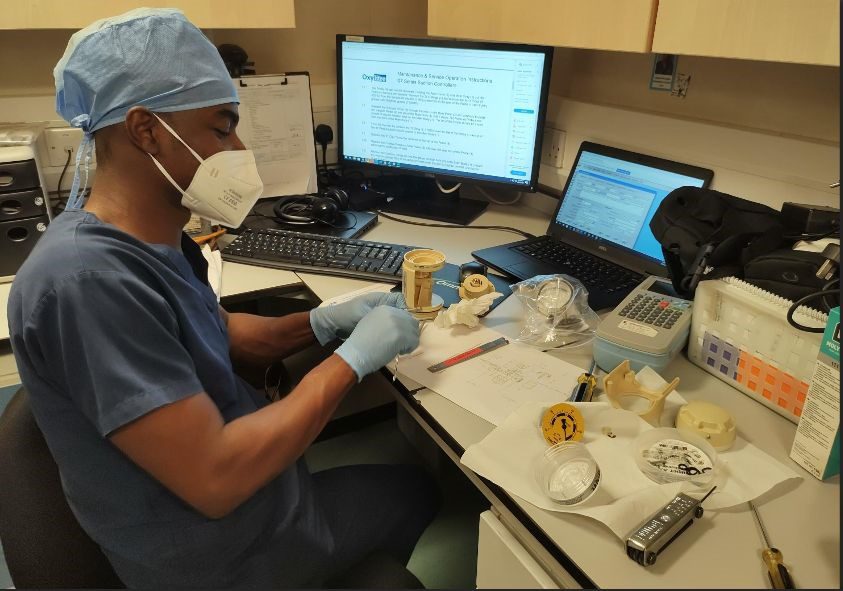

The importance of volunteering in healthcare
Why is it important to you to volunteer?
As an individual who faced significant challenges growing up in poverty, I perceive it as my obligation to contribute to the welfare of my community. This stems from a personal sense of duty, as I have personally experienced the struggles and helplessness associated with impoverished circumstances.
Volunteering, in essence, represents a manifestation of my inherent commitment to giving back, a sentiment grounded in my past experiences and a desire to assist those who may currently face similar challenges.
Balancing studying whilst working in healthcare
You are currently completing a master’s degree. How do you balance working and studying?
Professor Kaufmann serves as my mentor and helps me with efficient time management. According to her guidance, meticulous time management enables substantial accomplishments. Embracing this principle, I refrain from procrastination, adhering to the philosophy that tasks scheduled for today should be promptly addressed without delay.
Why do you think your master’s degree will make you a better engineer and manager?
In addition to acquiring knowledge on tackling contemporary issues through my master’s degree, my final project, has honed my ability to initiate and complete a project independently. Not only have my reading and writing skills experienced significant enhancement, but there has also been a notable improvement in my critical thinking and confidence in decision-making. Additionally, I have seen advancements in other areas, including heightened emotional intelligence and improved communication skills.
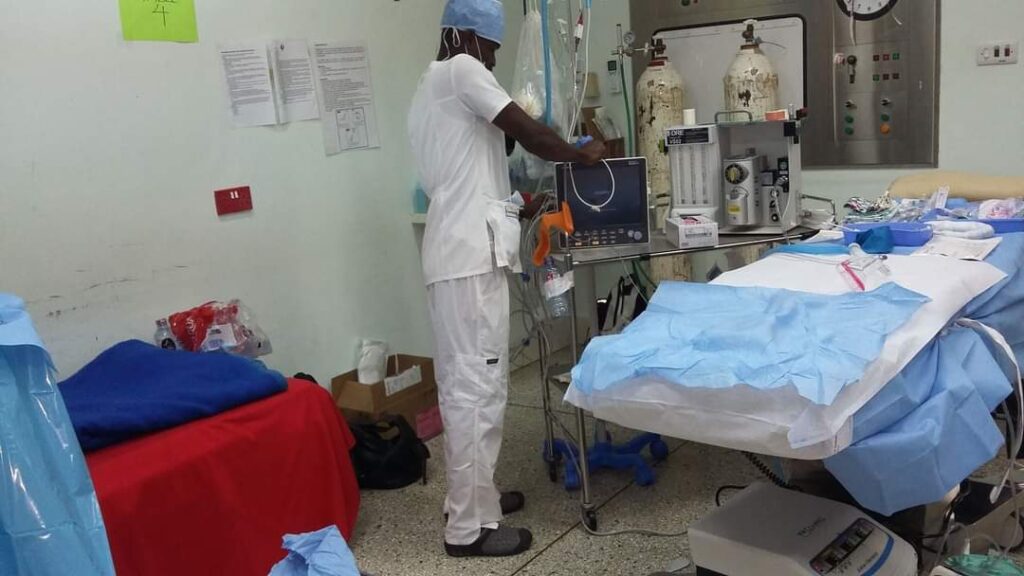

Most challenging part of the job in healthcare
What is the most challenging part of your current role?
The most demanding aspect of the job involves the scarcity of resources, and the separation from one’s family. As well, it is challenging to collaborate with individuals who lack enthusiasm or have a very low understanding of our role and are not willing to change.
Hospitals and medical facilities can be places where there is a lot of pressure on staff. How do you handle things when people are very stressed?
Empathy involves adopting the client’s perspective and communicating in a reassuring manner. It is essential to maintain the professionalism of colleagues and senior officials without undermining it. However, when opportunities arise, identified issues are communicated with recommendations in a humble and sincere manner.
Handling pressure and problems
How do you advise new engineers to handle pressure of work?
For new engineers wrestling with the pressures of their workload, my advice is to prioritise tasks wisely, by employing effective time management techniques. Setting realistic goals and communicating openly with colleagues about workload and deadlines can help in managing expectations. Learning to delegate tasks, taking short breaks, and adopting healthy coping strategies contribute to stress management. Continuous learning and seeking mentorship from experienced colleagues can provide valuable insights. Emphasising the importance of maintaining a work-life balance is crucial to prevent burnout. By integrating these practices, new engineers can navigate work pressures more effectively and foster a sustainable and fulfilling professional journey.
What is your technique for solving a difficult problem?
In tackling challenging problems, collaboration with colleagues and embracing diverse perspectives is fundamental to gaining valuable insights. My adept colleague, Kwabena Debrah, serves as my preferred go-to person, and when faced with more formidable challenges, I turn to my senior colleague, Mr. John Zienaa. Throughout the problem-solving process, I place a premium on logical reasoning, data analysis, and critical thinking. Employing iterative testing and refining proposed solutions allows for a thorough assessment of their effectiveness. Maintaining a positive mindset, adaptability, and resilience in the face of challenges are integral aspects of my problem-solving technique, contributing to a holistic and effective approach.
New medical engineers working in healthcare
What sort of personality traits and skills are ideal to be a medical engineer?
Being a successful medical engineer requires a combination of technical expertise, adaptability, and strong interpersonal skills.
Technical proficiency in engineering principles and medical technology is fundamental, encompassing a sound understanding of electronics, mechanics, and biomedical systems. Analytical thinking and problem-solving skills are essential for addressing complex issues in medical equipment.
Adaptability is crucial due to the dynamic nature of healthcare technology and the need to stay abreast of advancements. Effective communication and collaboration skills are paramount when working with healthcare professionals and diverse teams. Attention to detail and precision are vital, as medical engineering involves designing, maintaining, and troubleshooting intricate medical devices.
Additionally, empathy and a commitment to ethical practices contribute to fostering a patient-centric approach in the development and maintenance of medical equipment.
Apart from a strong technical background, what are the three most important skills to have?
Effective communication, paying attention to details, and teamwork.
How do you think medical engineers differ from other engineers?
The exploration of this question lends itself to multiple perspectives, I hold a respectful view towards all engineers. I am convinced that by collectively investing in common qualities and principles, we can make a significant impact on saving lives and preventing fatalities.
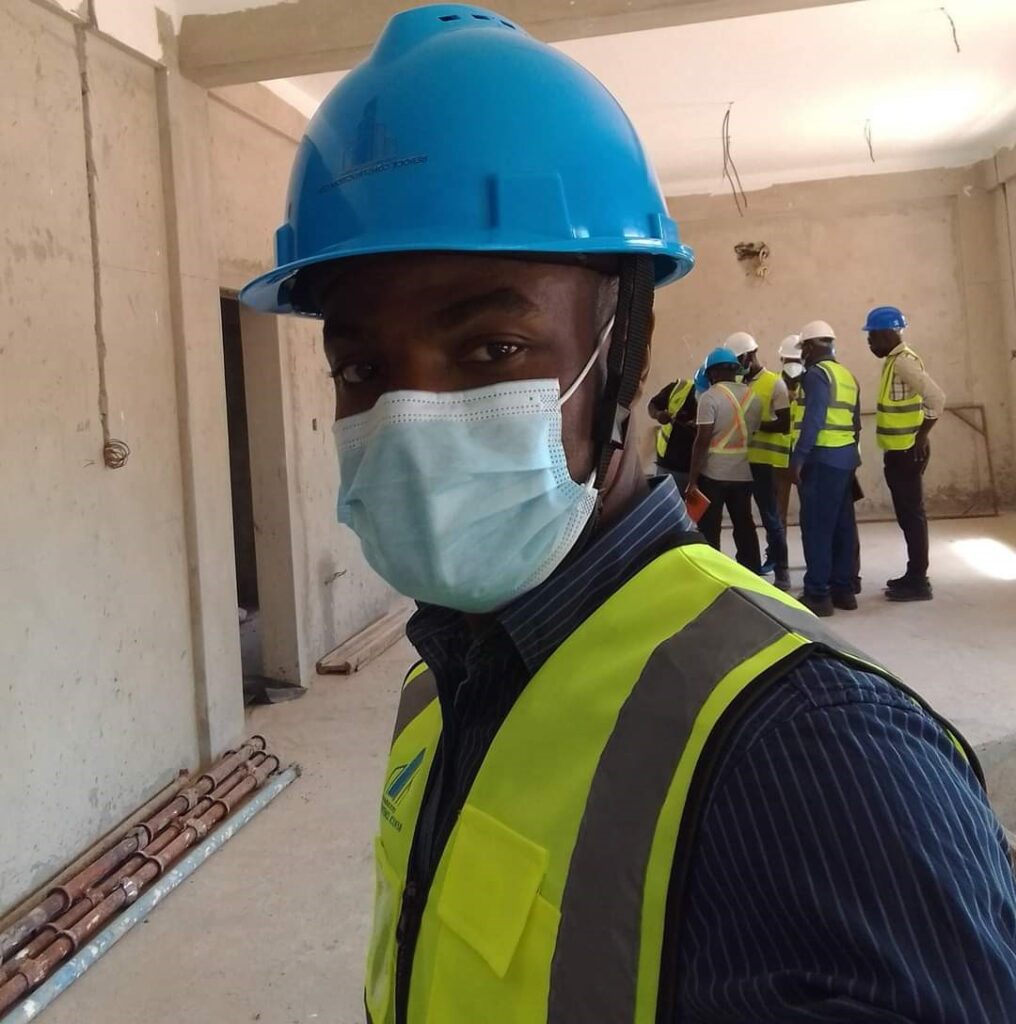

Advice for someone thinking of a career as a medical engineer
What advice would you give to someone who is thinking of a career as a medical engineer?
For someone contemplating a career as a medical engineer, I would advise prioritising a strong foundation in engineering principles and biomedical sciences. Pursuing relevant academic qualifications and gaining hands-on experience through internships or practical projects is crucial. Additionally, staying abreast of advancements in medical technology and fostering a deep understanding of healthcare systems is essential. Developing effective communication skills, as well as the ability to collaborate with interdisciplinary teams and healthcare professionals, will be beneficial. Embracing a commitment to ethical practices and patient centred approaches is paramount in this field. Continuous learning and adaptability to evolving technologies will further contribute to a successful and fulfilling career as a medical engineer.
Future of Medical Engineering in Africa
How do you think medical engineering will change in Africa over the next twenty years?
Predicting the future of medical engineering in Africa over the next twenty years involves considering several factors. Technological advancements are likely to play a pivotal role, with increased integration of digital health solutions, telemedicine, and artificial intelligence to enhance diagnostics and healthcare delivery.
Improved access to medical engineering education and training may lead to a growing pool of skilled professionals, fostering innovation and sustainable solutions tailored to the unique challenges faced in the African healthcare landscape.
Collaborations with international organizations and partnerships between public and private sectors may facilitate the adoption of cutting-edge medical technologies.
However, challenges such as resource constraints and infrastructure limitations need to be addressed. Overall, the trajectory of medical engineering in Africa may see a transformative shift towards more accessible, technologically advanced, and locally relevant healthcare solutions.
Which change would you personally like to see?
Increased integration of digital health solutions, telemedicine, and artificial intelligence.


Responses